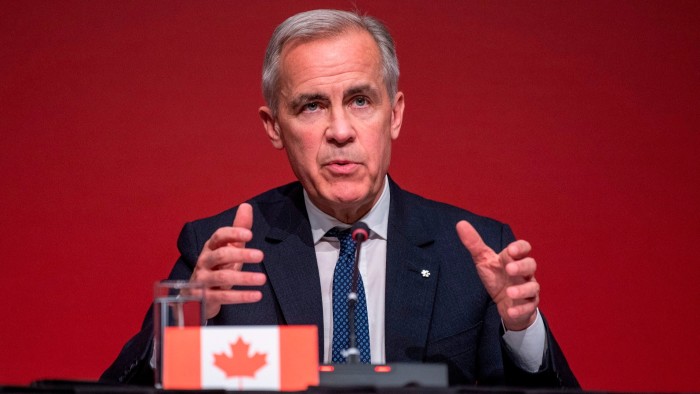Unlock the Editor’s Digest for free
Roula Khalaf, Editor of the FT, selects her favourite stories in this weekly newsletter.
Mark Carney has vowed to work with Canada’s oil industry to boost production and reduce emissions, as the new prime minister touts an economic agenda to face down Donald Trump’s tariff threats.
The Canadian leader met senior oil executives in recent days, extending an olive branch to a sector that become hostile to the Liberal government in Ottawa under Carney’s predecessor Justin Trudeau.
Carney offered tentative backing for new pipelines and a multibillion-dollar project to capture carbon from Alberta’s oil sands, describing a “grand bargain” to support new energy exports while reducing emissions.
“There’s real potential there,” Carney told journalists in Saskatoon, a city in the western province of Saskatchewan, on Monday.
“We can give ourselves far more than any foreign government can ever take away,” he said. “So we’re in a position where we can build big, build bold, build one Canadian economy and build now.”
The overture to the oil sector marks a shift for Carney, who warned of the climate risks associated with fossil fuel production while governor of the Bank of England.
More recently he was a champion of global decarbonisation efforts as co-chair of the Glasgow Financial Alliance for Net Zero, which mobilised $130tn in private capital for climate action.
Canada’s oil production is among the drivers of its economy, but executives have chafed at Ottawa’s restrictions on efforts to build new pipelines to support more growth and break their dependence on US markets.
Carney has also endorsed efforts to find new markets for his country in the wake of Trump’s tariffs and hostility, including claims that Canada should become a 51st state. Canada is by far the biggest foreign supplier of oil to the US, which accounts for almost all of Canadian energy exports.
The prime minister, who has vowed to speed up approvals for new projects, spoke with provincial leaders about how to prioritise projects that bring “investment to make Canada into an energy superpower and to build the strongest economy in the G7”.
Carney staged a remarkable electoral victory earlier this year, tapping anti-Trump sentiment and vowing to shore up the economy to survive a trade war. His pledge to make Canada an “energy superpower” was a common refrain on the campaign trail.
But he is also facing opposition in western provinces that have long objected to Ottawa’s regulations, especially on energy and climate. Carney’s election victory in April has reinvigorated Alberta’s separatist movement which wants a local referendum on the issue.
The outreach efforts by Carney has won some approval in Calgary, Alberta, the country’s oil capital.
“We have recognised and appreciate the significant change in tone from Prime Minister Carney’s new federal government,” said Lisa Baiton, chief executive of the Canadian Association of Petroleum Producers.
Baiton said they were also “very encouraged” by the appointment of energy minister Tim Hodgson, who was formerly at Goldman Sachs and MEG Energy, another oil producer in Alberta.
About C$26bn (US$18.9bn) worth of new oil projects are under construction in Canada and more than C$100bn worth of planned projects or those waiting for a final investment decision, according to Capp.
Carney on Sunday met Canada’s energy sector leaders in Saskatoon to talk up his ambitious agenda to revitalise the country’ economy and reboot federal relations with companies and leaders in the country’s west.
A senior executive at one of the companies that met the prime minister said there was “cautious optimism” over his stance.
A C$20bn project, called Pathways Alliance, has been pushed by oil companies in western Canada as a way to reduce the emissions associated with producing crude that is considered among the most carbon-intensive in the world.
Alberta’s conservative premier Danielle Smith has sought to link federal government support for new export pipeline projects to the plan to capture carbon from the oil sands.
“It would cost anywhere from C$10bn to C$20bn to get this built,” Smith said, referring to the carbon-capture project. “If we had a million barrels a day pipeline going to the north-west British Columbia coast, that would generate about C$20bn a year in revenue.”
Carney said “decarbonised Canadian oil and gas” must get to global markets, including Asia and Europe, after the emissions associated with its extraction were captured in Alberta.
Other executives had mixed reviews about Carney’s strategy with the oil companies.
“I told the prime minister that the federal government has got it half right,” said Adam Waterous, chair of Strathcona Resources, Canada’s fifth-largest oil producer.
He praised Ottawa’s “carrots”, such as support for the oil industry’s carbon capture projects, but criticised “sticks” such as legislation restricting new cross-country pipelines.
François Poirier, chief executive of TC Energy, one of the largest North American pipeline companies, has not jumped at the chance to promote new projects due to the associated costs.
“The prime minister has shown in early conversations since being elected to be quite pragmatic,” he said.
Climate Capital
Where climate change meets business, markets and politics. Explore the FT’s coverage here.
Are you curious about the FT’s environmental sustainability commitments? Find out more about our science-based targets here

